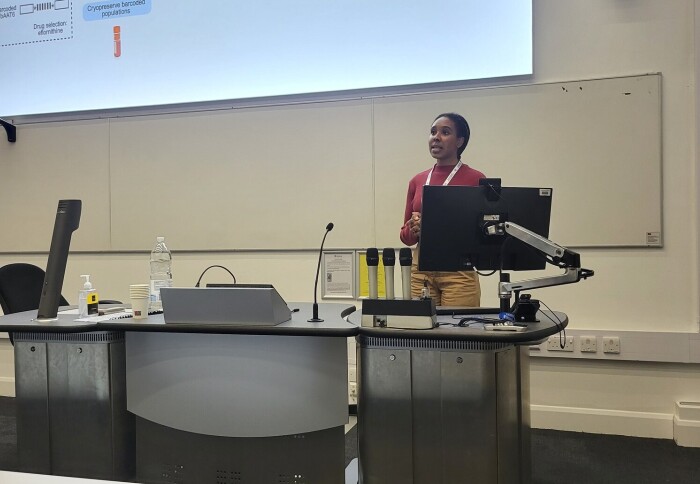Fatima Taha wins best talk prize at British Society for Parasitology conference
by Emily Govan

Fatima Taha, a PhD student in the Department of Life Sciences, recently won the prize for best talk at the British Society for Parasitology meeting.
At the meeting held at the University of Liverpool, Fatima presented work from her PhD on a novel CRISPR-based approach for cellular barcoding that she developed to track the migration patterns of trypanosome parasites in different host niches, including the brain. Her research aims to understand how these parasites colonise and establish infections in different body niches despite the continuous onslaught from the host immune system. Fatima’s work will provide valuable insights into trypanosome disease pathology within host tissues and has the potential to aid in the development of more effective treatments.
Dr. Calvin Tiengwe said: ‘Fatima’s award is well-deserved and marks a significant milestone in her PhD project and career. Not only did Fatima give an excellent presentation, but the judges also recognised the potential of this tool to have broad applicability across a range of parasites.’
Fatima's work is funded by a Widening Participation BBSRC DTP studentship at the Department of Life Sciences at Imperial College London, and co-supervised by Dr. Calvin Tiengwe and Dr. Matthew Child.
"I was pleased to see that my research was conveyed in an impactful way to an audience with broad interests and rich histories in the field. I am thankful for having received this award and hope to continue doing meaningful research during my PhD and beyond." Fatima Taha PhD student
Fatima said: ‘The annual BSP conference invites researchers from all backgrounds working in parasitology to share their latest research and is a great networking event.
I was one of three students awarded best student speaker at the conclusion of the conference which was a huge honour. I was pleased to see that my research was conveyed in an impactful way to an audience with broad interests and rich histories in the field. It has renewed my enthusiasm for my project and has opened opportunities for collaborations and interesting questions my project can answer. I am thankful for having received this award and hope to continue doing meaningful research during my PhD and beyond.’
Article text (excluding photos or graphics) © Imperial College London.
Photos and graphics subject to third party copyright used with permission or © Imperial College London.
Reporter
Emily Govan
Department of Life Sciences